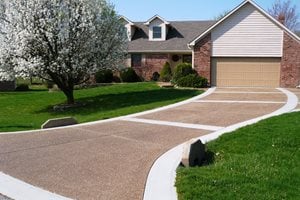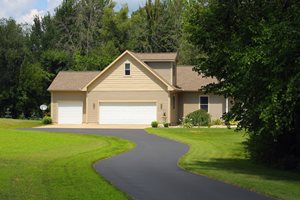Homeowners tend to be resolute in their opinions about the best material for paving a driveway. Some swear by asphalt, while others are staunch proponents of poured-in-place concrete. Both candidates have their merits, so it can take some convincing to make a strong case for one over another. Here’s a look at the key differences between the two materials and the reasons why we think concrete is often the better choice.

Concrete Tailors in Noblesville, IN
CONCRETE DRIVEWAY
Cost: $5 to $18+ per square foot, depending on options
Curing time: At least 7 days
Longevity: 40 years or longer
Decorative options: Can color, stamp, engrave, stencil, stain.
Maintenance: Sealing enhances performance and appearance.
Repairs: Harder to repair, replace or resurface.
Heat reflectivity: Good at reflecting solar and artificial light.

Sam Ives / Shutterstock
ASPHALT DRIVEWAY
Cost: $2 to $4 per square foot
Curing time: 2 to 3 days
Longevity: 15 to 20 years
Decorative options: Few options for customization.
Maintenance: Requires seal coating every 3 to 5 years.
Repairs: Easier to patch, less costly to replace.
Heat reflectivity: Poor, absorbs heat and becomes hot
Is asphalt cheaper than concrete?
With few exceptions, asphalt is easier on the budget than concrete. Typical installation costs for a new asphalt driveway run about $2 to $4 per square foot, although prices can go higher depending on crude oil prices. In contrast, the cost to install a plain no-frills concrete driveway is about $5 to $7 per square foot. Adding decorative enhancements, such as stamping and staining, can easily double the cost because of the extra labor and materials involved (see Cost of a Concrete Driveway).
Get quotes from concrete driveway contractors near me.
But the installation cost is only part of the story. In a comparison of life-cycle costs between the two materials, concrete is often the most economical option because it has a longer life expectancy and lower maintenance costs. What’s more, a high-end decorative concrete driveway can significantly improve a home’s curb appeal and boost its resale value.
Installation and curing time
Both concrete and asphalt driveways need to be installed over a well-compacted, properly graded subgrade, so the work required to prepare the foundation is similar. Placement times are comparable as well, typically taking about a day after subgrade preparation is complete (although more time may be required for stamped or stained concrete). The advantage of an asphalt driveway is that it can be driven on sooner after installation, usually within two or three days. A concrete driveway needs to cure for at least seven days before it’s ready for vehicle traffic (see How Long Does It Take for Concrete to Cure?).
If long cure times are a problem, there is a third option to consider: precast concrete driveway pavers. They offer design versatility similar to poured-in-place concrete but can be driven on immediately after placement.
How long does an asphalt driveway last vs concrete?
Here is where a concrete driveway offers a clear advantage, offering a service life double to triple that of asphalt. The typical life expectancy of an asphalt driveway is 15 to 20 years, while a concrete driveway can last 40 years or longer.
Of course, to achieve its full life expectancy, a concrete driveway needs to be installed properly. Read this overview of driveway construction basics to learn what it takes to ensure a durable, problem-free concrete driveway.
Decorative options
Again, the competitive edge goes to concrete driveways, which even at their most basic can enhance the curb appeal of a home and complement its architectural style. An asphalt driveway offers very few options for customization, while concrete can be stamped, stained, texturized, stenciled, or integrally colored to achieve an endless array of unique looks. (See these design ideas for customizing a new concrete driveway.)
Even an existing concrete driveway can be given a decorative makeover with techniques such as driveway staining, stamped concrete overlays and concrete engraving.
Routine maintenance
Both asphalt and concrete driveways require routine cleaning and maintenance to keep them looking their best and to protect them from wear and tear. Many installers of asphalt driveways recommend seal coating the surface every three to five years to help preserve the oils in the asphalt and prevent brittleness and premature cracking.
In general, concrete doesn’t have to be sealed to perform well, but driveways with decorative finishes can benefit from the application of a sealer every few years to enhance the color and minimize surface abrasion. A sealer can also make cleaning easier by preventing the penetration of oil and stains. See these tips for maintaining a concrete driveway.
Which is easier to repair?
Although concrete driveways are generally easier to maintain and more durable than asphalt driveways, repairing and replacing them is often more difficult and costly. However, as long as a concrete driveway is structurally sound, there are ways to repair minor and even major defects without tearing it out and replacing it completely. (Check out these options for repairing or resurfacing a concrete driveway.)
In comparison to poured-in-place concrete, precast concrete paver driveways offer the advantage of easy, seamless replacement if repairs are needed. Any damaged, cracked, or sunken pavers can simply be replaced or reset with no noticeable patchwork.
Does asphalt get hotter than concrete?
Because of their light color, concrete driveways and other pavements absorb less heat and reflect more solar radiation than their asphalt counterparts, minimizing the effects that produce urban heat islands and reducing air conditioning demands in the summer. Since they absorb less UV radiation than asphalt, they’re also more comfortable to walk on under the hot sun. Concrete driveways reflect artificial light as well, which improves their visibility at night and allows homeowners to use less exterior lighting.
Why concrete makes sense
How well your driveway looks and performs long-term is largely dependent on the quality of workmanship and materials that go into it. Although an asphalt driveway is usually the most cost-effective option initially, it won’t last as long as a concrete driveway and may need to be replaced sooner. And if you’re looking for a driveway material that offers myriad options for customization and can improve the resale value of your home, concrete is well worth the investment.
Tip: Driveways aren’t the only pavements where concrete is often a better choice than asphalt. Learn why concrete parking lots are preferable to asphalt, and the advantages of concrete tennis courts.
Related:Stamped Concrete vs. Pavers
6 Types of Driveways to Consider